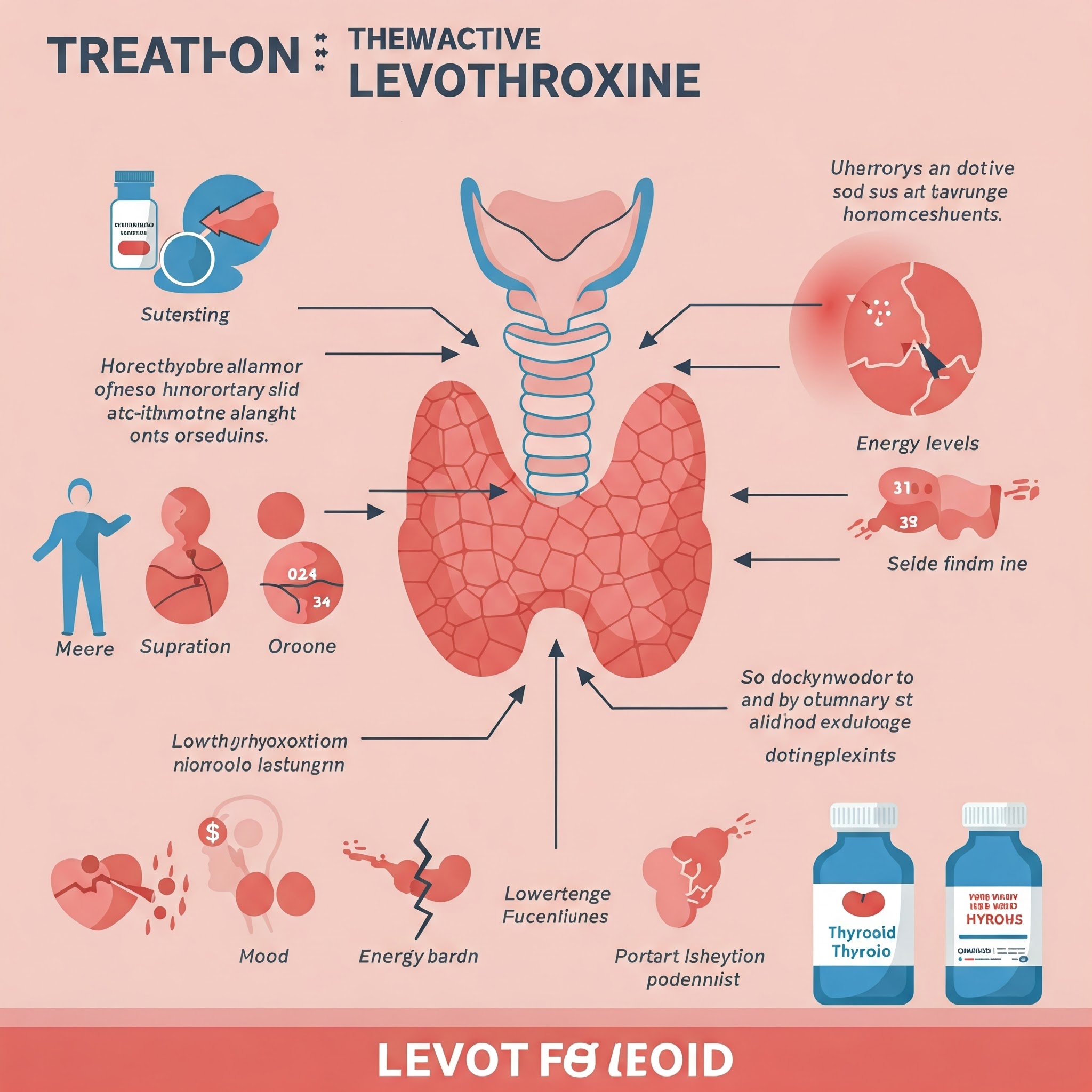Arthritis: causes, symptoms and treatment
What is the difference between osteo and rheumatoid arthritis, and what are the causes and treatment options? Read our blog to find out.

An underactive thyroid, medically known as hypothyroidism, is a common endocrine disorder where the thyroid gland doesn't produce enough thyroid hormones. These hormones, primarily thyroxine (T4), are crucial for regulating the body's metabolism, energy levels, temperature, and the function of vital organs. When their production is insufficient, a cascade of symptoms can arise, including fatigue, weight gain, cold sensitivity, dry skin, hair loss, and depression. Fortunately, a synthetic hormone replacement medication called Levothyroxine has revolutionized the treatment of hypothyroidism, allowing millions to manage their condition effectively and lead healthy lives.
Understanding Hypothyroidism
Hypothyroidism can stem from various causes, with the most prevalent being Hashimoto's thyroiditis, an autoimmune disease where the body's immune system mistakenly attacks the thyroid gland. Other causes include thyroid surgery, radioactive iodine treatment, certain medications, congenital thyroid defects, or issues with the pituitary gland, which regulates thyroid function.
Regardless of the cause, the result is a deficiency in thyroid hormones, leading to a slowdown of bodily processes. Diagnosing hypothyroidism typically involves blood tests to measure levels of Thyroid Stimulating Hormone (TSH) and often T4. Elevated TSH levels usually indicate that the pituitary gland is working harder to stimulate a sluggish thyroid, while low T4 levels confirm the hormone deficiency.
Levothyroxine: Replacing the Missing Hormone
Levothyroxine is a synthetic version of the naturally occurring thyroid hormone, thyroxine (T4). When taken as prescribed, it effectively replaces the hormone that the thyroid gland is unable to produce in sufficient quantities. This replenishment helps to restore the body's metabolic balance and alleviate the symptoms of hypothyroidism.
The medication is available in oral tablet and liquid forms and is typically taken once daily. Finding the correct dosage is crucial and is determined by a healthcare provider based on individual needs, often starting with a low dose and gradually increasing it while monitoring TSH levels through regular blood tests. This titration process ensures that hormone levels are normalized, avoiding both the symptoms of hypothyroidism (too little hormone) and hyperthyroidism (too much hormone).
Taking Levothyroxine Correctly
Optimal absorption of Levothyroxine is achieved when taken on an empty stomach, usually in the morning, at least 30 to 60 minutes before eating or drinking anything other than water. Certain foods, supplements (like calcium and iron), and medications can interfere with its absorption, making it essential to be mindful of timing and potential interactions. Healthcare providers will provide specific instructions on how to take the medication and manage any potential interactions.
Consistency is key to successful treatment with Levothyroxine. Taking the medication at the same time each day helps maintain stable hormone levels. If a dose is missed, it's generally advised to take it as soon as remembered, but double-dosing to compensate should be avoided unless directed by a doctor.
Potential Side Effects and Considerations
When the dosage is correctly adjusted, Levothyroxine typically has few side effects. However, if the dose is too high, it can lead to symptoms of hyperthyroidism, such as a rapid heartbeat, palpitations, nervousness, tremors, increased sweating, weight loss, and difficulty sleeping. It is crucial to report any new or worsening symptoms to a healthcare provider, as dosage adjustments may be necessary.
Individuals with pre-existing heart conditions or the elderly may be started on a lower dose to avoid potential strain on the cardiovascular system. Levothyroxine can also interact with other medications, so it's vital to inform your doctor about all prescription, over-the-counter, and herbal supplements you are taking.
Living with Hypothyroidism and Levothyroxine
Hypothyroidism is often a lifelong condition requiring continuous treatment with Levothyroxine. Regular monitoring of thyroid hormone levels through blood tests is essential to ensure the dosage remains optimal over time, as individual needs can change due to various factors, including age, weight fluctuations, pregnancy, or the introduction of new medications.
While Levothyroxine effectively manages the symptoms of hypothyroidism, maintaining a healthy lifestyle is also important for overall well-being. A balanced diet and regular exercise can complement the medication's effects and contribute to improved energy levels and mood.
In conclusion, Levothyroxine is a safe and effective medication that has transformed the management of hypothyroidism. By replacing the deficient thyroid hormone, it allows individuals to regain their vitality and live full, active lives. Consistent adherence to the prescribed dosage and regular medical follow-up are crucial for successful treatment and long-term health.
What is the difference between osteo and rheumatoid arthritis, and what are the causes and treatment options? Read our blog to find out.
Want to learn more about testicular cancer? Read our informative blog to find out everything you need to know.
What are the differences between generic and brand-name medication? Find out how generic medications are marketed and why generic prescribing is desirable to the NHS.
What are the differences between paracetamol and ibuprofen? Read more to find out everything you need to know about paracetamol.
What is omeprazole, how do you take it safely and what are the side effects? Read our useful guide to learn everything you need to know.
What is ramipril? How does it work to treat high blood pressure or hypertension? Read out guide to find out more.